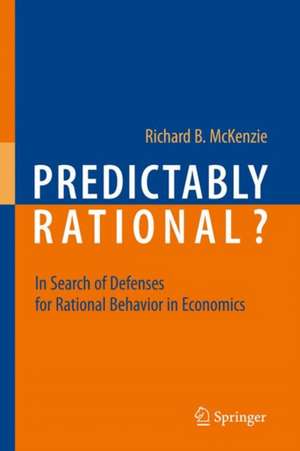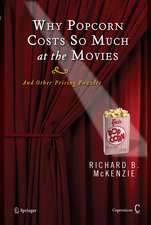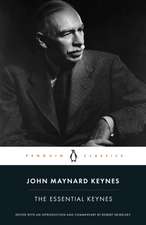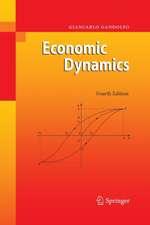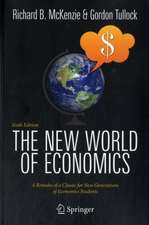Predictably Rational?: In Search of Defenses for Rational Behavior in Economics
Autor Richard B. McKenzieen Limba Engleză Paperback – 23 noi 2009
Preț: 529.28 lei
Preț vechi: 622.68 lei
-15% Nou
Puncte Express: 794
Preț estimativ în valută:
101.28€ • 105.96$ • 84.13£
101.28€ • 105.96$ • 84.13£
Carte tipărită la comandă
Livrare economică 02-16 aprilie
Preluare comenzi: 021 569.72.76
Specificații
ISBN-13: 9783642015854
ISBN-10: 3642015859
Pagini: 332
Ilustrații: XXII, 308 p. 1 illus.
Dimensiuni: 155 x 235 x 28 mm
Greutate: 0.47 kg
Ediția:2010
Editura: Springer Berlin, Heidelberg
Colecția Springer
Locul publicării:Berlin, Heidelberg, Germany
ISBN-10: 3642015859
Pagini: 332
Ilustrații: XXII, 308 p. 1 illus.
Dimensiuni: 155 x 235 x 28 mm
Greutate: 0.47 kg
Ediția:2010
Editura: Springer Berlin, Heidelberg
Colecția Springer
Locul publicării:Berlin, Heidelberg, Germany
Public țintă
ResearchCuprins
Economists’ “Irrational Passion for Dispassionate Rationality”.- The Methodological Constraints on the Rationality Premise.- Human Motivation and Adam Smith’s “Invisible Hands”.- Rationality in Economic Thought: From Thomas Robert Malthus to Alfred Marshall and Philip Wicksteed.- Rationality in Economic Thought: Frank Knight, Ludwig von Mises, Friedrich Hayek, and James Buchanan.- Behavioral Economists, and Psychologists’ Challenges to Rational Behavior.- The Evolutionary Biology of Rational Behavior.- The Neuroeconomics of Rational Decision Making.- Economic Defenses for Rational Behavior in Economics.- Problems with Behavioral Economics.- Rationality and Economic Education.
Recenzii
From the reviews:
One reviewer (Nobel Laureate in Economics) described the book as a "massise effort," because of the breadth of the inquiry, covering from the intellectual history of the rationality premise (from Adam Smith to modern economists) to the evolutionary biology of the concept to the neurobiology/economics of the concept to the behavioral economics/psychology of the criticisms.
“McKenzie (Univ. of California, Irvine) defends homo economicus, the perfectly rational maximizer of self-interest, assumed in Chicago-style economics as the conceptual basis of efficient markets, rational expectations, and the efficacy of free market capitalism. … Summing Up: Recommended. Upper-division undergraduate through faculty and research collections.” (R. S. Hewett, Choice, Vol. 47 (11), July, 2010)
One reviewer (Nobel Laureate in Economics) described the book as a "massise effort," because of the breadth of the inquiry, covering from the intellectual history of the rationality premise (from Adam Smith to modern economists) to the evolutionary biology of the concept to the neurobiology/economics of the concept to the behavioral economics/psychology of the criticisms.
“McKenzie (Univ. of California, Irvine) defends homo economicus, the perfectly rational maximizer of self-interest, assumed in Chicago-style economics as the conceptual basis of efficient markets, rational expectations, and the efficacy of free market capitalism. … Summing Up: Recommended. Upper-division undergraduate through faculty and research collections.” (R. S. Hewett, Choice, Vol. 47 (11), July, 2010)
Notă biografică
Richard McKenzie is the Walter B. Gerken Professor of Enterprise and Society in the Paul Merage School of Business at the University of California, Irvine. Widely published in academic journals and general audience publications, his two most recent books are In Defense of Monopoly: How Market Power Fosters Creative Production (University of Michigan Press, 2008) and Why Popcorn Costs so Much at the Movies, And Other Pricing Puzzles (Springer, 2008) (www.merage.uci.edu/~mckenzie)
Textul de pe ultima copertă
Mainstream economists everywhere exhibit an "irrational passion for dispassionate rationality." Behavioral economists, and long-time critic of mainstream economics suggests that people in mainstrean economic models "can think like Albert Einstein, store as much memory as IBM’s Big Blue, and exercise the will power of Mahatma Gandhi," with a view that economists’ view of homo sapiens is simply wrongheaded. Indeed, Thaler and other behavioral economists and psychology have documented a variety of ways in which real-world people fall far short of mainstream economists' idealized economic actor, perfectly rational homo economicus. Behavioral economist Daniel Ariely has concluded that real-world people not only exhibit an array of decision-making frailties and biases, they are "predictably irrational," a position now shared by so many behavioral economists, psychologists, sociologists, and evolutionary biologists that a defense of the core rationality premise of modedrn economics is demanded.
In Predictably Rational? In Search of Defenses of Rational Behavior in Economics, Richard McKenzie, a professor of economics and management at the University of California, Irvine, takes up the challenge to defend mainstream economics’ core premise, but in unexpected ways. He first takes readers through a review of the intellectual history of the motivational premise undergirding economics from Adam Smith through to Alfred Marshall to Frank Knight, Ludwig von Mises, and Friedrich Hayek to Milton Friedman, George Stigler, and Gary becker. Professor McKenzie finds ample criticisms of the rationality premise within the intellectual history of the discipline. He also surveys the relevant literature in evolutionary biology and neurobiology and neujroeconomics, which fortifies the behavioralists’ criticisms that "perfect rationality" is not tenable.
Nonetheless, in spite of the evidence and arguments, Professor Mckenzie mounts defenses of continued use of therationality premise on counterintuitive grounds, not the least of which is that the demonstrated "irrationalities" in human decision makes all the more compelling the use of the perfect rationality premise in economics. Economists are themselves drawm from the human population. They must operate within their own limited and mistake-prone mental faculities. The premise of rationality is one means by which economists can gain insights about complex human interactions that might not exscape them if they assume people were not more rational than economists know them to be. In addition, economists’ perfect rationality premise is not only a means for deriving testable hypotheses, it is also a standard by which economists, and their students, can derive heuristics that can lead to improved decision making (or decision making that is better than might be expected of real-world people without instruction in the "economic way of thinking"). Professor McKenzie draws conclusions that are at odds with standard, mainstream economics, not the least of which is that markets do more to improve economic efficiency than conventional microeconomics supposes. Markets not only allocate efficiently known resources among known wants. They also provide feedback mechanisms that the human brain needs to operate more efficiently and that improve decision making, as well as hone people’s wants and appreciation of resources. Markets can make people more rational than they may be inclined to be.
Richard McKenzie is the Walter B. Gerken Professor of Enterprise and Society in the Paul Merage School of Business at the University of California, Irvine. Widely published in academic journals and general audience publications, his two most recent books are In Defense of Monopoly: How Market Power Fosters Creative Production (University of Michigan Press, 2008) and Why Popcorn Costs so Much at the Movies, And Other Pricing Puzzles (Springer, 2008) (www.merage.uci.edu/~mckenzie)
In Predictably Rational? In Search of Defenses of Rational Behavior in Economics, Richard McKenzie, a professor of economics and management at the University of California, Irvine, takes up the challenge to defend mainstream economics’ core premise, but in unexpected ways. He first takes readers through a review of the intellectual history of the motivational premise undergirding economics from Adam Smith through to Alfred Marshall to Frank Knight, Ludwig von Mises, and Friedrich Hayek to Milton Friedman, George Stigler, and Gary becker. Professor McKenzie finds ample criticisms of the rationality premise within the intellectual history of the discipline. He also surveys the relevant literature in evolutionary biology and neurobiology and neujroeconomics, which fortifies the behavioralists’ criticisms that "perfect rationality" is not tenable.
Nonetheless, in spite of the evidence and arguments, Professor Mckenzie mounts defenses of continued use of therationality premise on counterintuitive grounds, not the least of which is that the demonstrated "irrationalities" in human decision makes all the more compelling the use of the perfect rationality premise in economics. Economists are themselves drawm from the human population. They must operate within their own limited and mistake-prone mental faculities. The premise of rationality is one means by which economists can gain insights about complex human interactions that might not exscape them if they assume people were not more rational than economists know them to be. In addition, economists’ perfect rationality premise is not only a means for deriving testable hypotheses, it is also a standard by which economists, and their students, can derive heuristics that can lead to improved decision making (or decision making that is better than might be expected of real-world people without instruction in the "economic way of thinking"). Professor McKenzie draws conclusions that are at odds with standard, mainstream economics, not the least of which is that markets do more to improve economic efficiency than conventional microeconomics supposes. Markets not only allocate efficiently known resources among known wants. They also provide feedback mechanisms that the human brain needs to operate more efficiently and that improve decision making, as well as hone people’s wants and appreciation of resources. Markets can make people more rational than they may be inclined to be.
Richard McKenzie is the Walter B. Gerken Professor of Enterprise and Society in the Paul Merage School of Business at the University of California, Irvine. Widely published in academic journals and general audience publications, his two most recent books are In Defense of Monopoly: How Market Power Fosters Creative Production (University of Michigan Press, 2008) and Why Popcorn Costs so Much at the Movies, And Other Pricing Puzzles (Springer, 2008) (www.merage.uci.edu/~mckenzie)
Caracteristici
Offers the first defense of the continued use of "perfect rationality" in microeconomics – in spite of the broadbased criticisms from behavioral economics and psychology that people are not rational The author argues that because the behavioralists have demonstrated people many irrationalities, economists would be well advised to continue to use the standard rationality premise Includes supplementary material: sn.pub/extras
